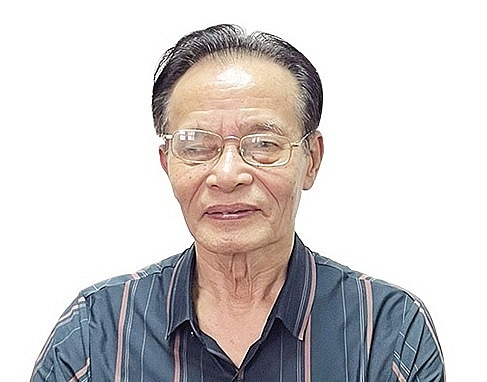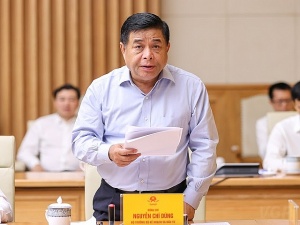Variables still at play in global monetary policy
Early this month, Fitch Ratings cut the US’ debt rating by one notch, from AAA to AA+. Will this affect its policy stance for the rest of this year?
 |
| Le Xuan Nghia |
A downgrade of the rating has rarely occurred in the US economy.
This fresh move might create pressure, prompting the country to loosen its monetary policy earlier than scheduled, even though concerns over inflation still persist.
Without the downgraded by Fitch, it is likely that the Fed would continue to increase interest rates slightly by 0.25 per cent in its September meeting, yet with this move, this possibility is unlikely.
In fact, at the end of this year, the Fed might actually lower interest rates in a bid to fuel consumption over the Christmas and New Year holidays.
Is there a potential risk that countries will continue to tighten their monetary policies instead of relaxing them as expected?
Over the past two years, inflation has shot up following the unprecedented amount of money that was pumped in to support people affected by the pandemic.
Even during previous crises, there was never such a large volume of money set aside for the recovery effort. The M2 money supply in the US, Japan, and Europe saw a 20-30 per cent jump during COVID-19, causing inflation to explode. This factor, however, no longer persists.
| I believe that inflation is unlikely to spike on a global scale, as although consumer demand has recovered, it is still quite feeble. |
Two variables that could cause inflation are food and fuel. Fuel prices are still very unpredictable. With food, major countries such as India and Russia have banned rice exports, while other countries like China have increased their rice stocks amidst continuous natural disasters. This might cause food prices to rise.
However, I believe that inflation is unlikely to spike on a global scale, as although consumer demand has recovered, it is still quite feeble.
Vietnam has been loosening its monetary policy for several months now. Is such a dose of easing enough to stimulate the economy?
The amount of monetary easing depends on how much the money supply increases, not how much interest rates fall.
At present, there are not many solutions to increase the money supply. Fortunately, Vietnam has a trade surplus, so the central bank (SBV) can replenish its foreign currency reserves. However, the volumes involved here have been low so far.
Open market operations have not been performing strongly. Hopefully, the SBV will increase its foreign currency purchases to allow it to pump more money into the market.
All that relates to the base money market, meaning the money flows outside commercial banks. Regarding the capital sources at banks, they are quite abundant now, but businesses still have difficulty borrowing. The current low credit growth is due to two a lack of orders and a sharp decline in the solvency of businesses.
The most worrisome problem now is that domestic demand is still weak and only recovering slowly. However, according to my prediction, the economy will recover more clearly in the fourth quarter of this year, and the Purchasing Managers' Index could reach 50 points or more.
 | FDI flows into Vietnam forecast to increase in H2: Experts The flows of foreign direct investment (FDI) into Vietnam are forecast to increase in the second half of the year as the downturn has been improved in recent months, experts have said. |
 | MPI highlights two GDP growth scenarios for H2 The Ministry of Planning and Investment (MPI) updated two scenarios in the second half of 2023 for Vietnam to strive for GDP growth of 6-6.5 per cent for the whole year, at the government's monthly meeting on July 4. |
 | Standard Chartered forecasts 7 per cent growth rate for Vietnam in H2 Standard Chartered Bank predicts that Vietnam's economy will experience a rebound in the second half of the year, with a growth rate of 7 per cent on-year that is driven by improving trade data and the country's economic openness and stability. |
 | Citi forecasts positive growth trajectory for Vietnam in H2 Citi forecasts Vietnam's economy is expected to sail through the challenges and maintain a positive growth trajectory in the second half of 2023. |
What the stars mean:
★ Poor ★ ★ Promising ★★★ Good ★★★★ Very good ★★★★★ Exceptional
Related Contents
Latest News
More News
- Banking sector targets double-digit growth (February 23, 2026 | 09:00)
- Private capital funds as cornerstone of IFC plans (February 20, 2026 | 14:38)
- Priorities for building credibility and momentum within Vietnamese IFCs (February 20, 2026 | 14:29)
- How Hong Kong can bridge critical financial centre gaps (February 20, 2026 | 14:22)
- All global experiences useful for Vietnam’s international financial hub (February 20, 2026 | 14:16)
- Raised ties reaffirm strategic trust (February 20, 2026 | 14:06)
- Sustained growth can translate into income gains (February 19, 2026 | 18:55)
- The vision to maintain a stable monetary policy (February 19, 2026 | 08:50)
- Banking sector faces data governance hurdles in AI transition (February 19, 2026 | 08:00)
- AI leading to shift in banking roles (February 18, 2026 | 19:54)

 Tag:
Tag:


























 Mobile Version
Mobile Version